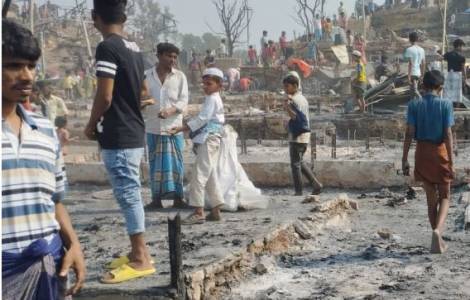
Caritas Internationalis
Sittwe (Agenzia Fides) - In order to replenish its ranks, decimated by combat losses, the Myanmar army is resorting to the forced recruitment of young men from the Rohingya people and sending them to the front in the fight against the Arakan Army, an ethnic militia that is resisting in Rakhine State, the Burmese state where the Rohingya, a discriminated and marginalized Muslim population in Myanmar, are traditionally based. As Rohingya organizations in the diaspora, including the Burmese Rohingya Organization UK and the Free Rohingya Coalition, report, “the Burmese regime has deliberately forcibly recruited the Rohingya because they are particularly vulnerable. They cannot escape due to movement restrictions imposed by the junta. Rakhine State is, so to speak, an open-air prison for the Rohingya. The junta considers them expendable. It is a cruel way to send the Rohingya to their deaths." At least a thousand young Rohingya men - around half of them internally displaced persons - have been forcibly recruited by the Burmese army in recent weeks. They were abducted from their homes, villages, markets and displaced persons camps and taken to army bases where they received military training. After two weeks of military training, the young men were armed and forced to wear Burmese military uniforms and sent to the front lines in Rakhine State. Non-governmental organizations fear that dozens of people have been killed, "although the exact number of victims is difficult to verify due to the news blackouts imposed by the regime in this region." Other internally displaced Rohingya who have returned to Sittwe, the capital of Rakhine state, after military training will be called to the front lines if necessary. In February last year, the Burmese regime announced that it would implement the 2010 law on compulsory military service. But in the case of the Rohingya, who were deprived of their citizenship by a 1982 law and thus have no protection or recognized rights, there would be no legal basis to impose compulsory military service on them.
The NGOs therefore point out that the Rohingya are stateless: they have neither a passport nor an identity card, they are internally displaced and are locked up in ghettos. They face systematic discrimination, violence and expulsion from their villages in Rakhine State and have always been viewed and defined by the junta as "illegal Bangladeshi immigrants." For this reason, between 2017 and 2018, more than a million Rohingya crossed the border in search of refuge from violence and settled in refugee camps in Bangladesh, where they still live in very difficult and precarious conditions. The forced recruitment of young men from the Rohingya people also takes place during the Islamic holy month of Ramadan. Many young people tried to escape and were sometimes seriously injured. Diaspora organizations report that the Rohingya were also forced to take part in protest demonstrations organized by the regime against the Arakan Army. The regime has ordered one person from each family to take part and handed out posters to participants to send them on the road promoting the junta's propaganda. The regime, it is alleged, is "stirring up ethnic and religious tensions to foment hatred and violence against the Rohingya." In January 2020, the International Court of Justice ordered Myanmar to take “all measures within its power” to protect the Rohingya. That ruling was never followed, and 600,000 Rohingya still living in Rakhine State continue to suffer violence and humiliation that "will lead to a slow death," it says, as they are "deliberately subjected to living conditions that lead to gradual death." “The Rohingya people will disappear, depriving them of resources essential for their survival" such as food, water, shelter, sanitation and medical care". In addition, there are strict restrictions on the Rohingya's freedom of movement, making it impossible for them to escape forced recruitment or other violence. After recalling them several times in recent years, Pope Francis once again recalled the drama of the Rohingya refugees in Myanmar and Bangladesh in the first general audience of 2024 on January 3rd: "And let us not forget our brothers and sisters, the Rohingya who are being persecuted", said the Pope. (PA) (Agenzia Fides, 5/4/2024)